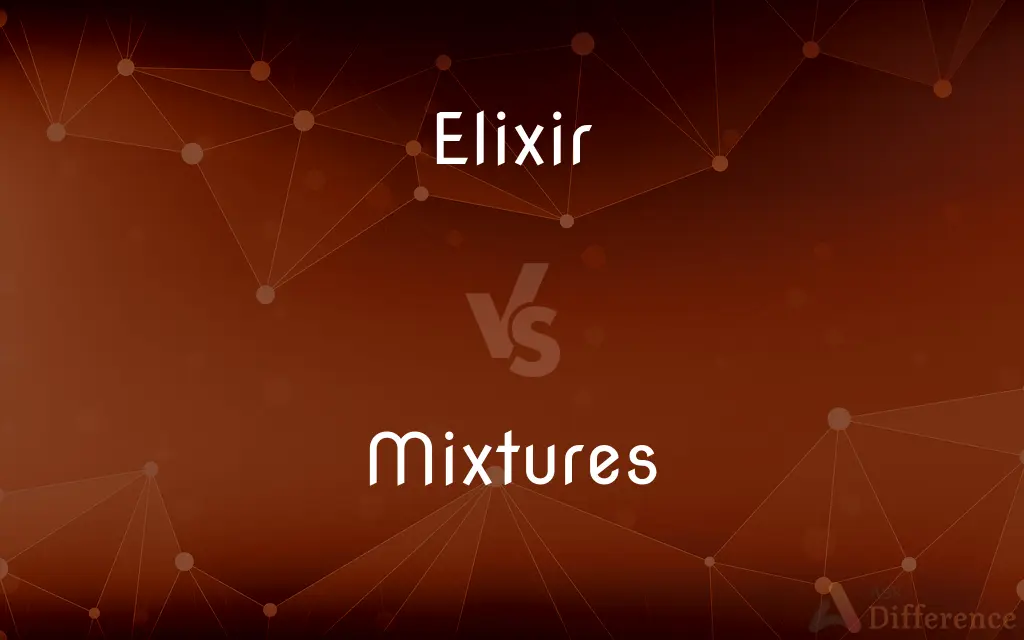Elixir vs. Mixtures — What's the Difference?
By Maham Liaqat & Fiza Rafique — Updated on April 15, 2024
An elixir is a clear, sweetened liquid used for medicinal purposes, often containing alcohol, whereas mixtures can be any combination of two or more substances, not necessarily homogeneous or for medicinal use.

Difference Between Elixir and Mixtures
Table of Contents
ADVERTISEMENT
Key Differences
Elixirs are a specific type of pharmaceutical preparation used primarily to deliver medication in a pleasant, palatable liquid form. They are often characterized by their clear, sweetened nature, which helps in masking the taste of potent drugs. Typically, elixirs contain active medicinal ingredients dissolved in a solvent that usually includes alcohol. On the other hand, mixtures are a broader category in chemistry and can include any combination of two or more substances mixed together without chemical bonding, ranging from gases and liquids to solids.
In pharmaceuticals, elixirs are used because of their ability to maintain the stability of the active ingredient while providing an easy method of drug delivery, especially useful for those who have difficulty swallowing pills. Mixtures, however, can be found in various forms like alloys, solutions, suspensions, and colloids, each with different properties depending on the nature of the substances mixed and their application in industries like food, medicine, and engineering.
The preparation of elixirs requires careful consideration of the solubility of components, preservation, and flavoring to ensure both efficacy and palatability. Conversely, mixtures might not require such precise considerations unless they are being prepared for specific scientific or manufacturing purposes. Mixtures can be heterogeneous, where the different components are visibly distinct, or homogeneous, where the blend is uniform throughout.
Elixirs are typically intended for oral consumption and are part of a regulated industry where formulation, safety, and efficacy are closely monitored. Mixtures might not be intended for consumption and could include everyday items like air (a mixture of gases) or concrete (a mixture of solids and liquids), demonstrating their varied applications beyond medicinal use.
Both elixirs and mixtures serve to combine substances, but the purpose behind each is significantly different. Elixirs combine to deliver medication effectively; mixtures can be for practical, aesthetic, or experimental purposes across different contexts and industries.
ADVERTISEMENT
Comparison Chart
Definition
A medicinal liquid containing a dissolved drug
A combination of two or more substances
Composition
Usually includes alcohol, a sweetener, and water
Can include any combination of solids, liquids, or gases
Homogeneity
Homogeneous
Can be homogeneous or heterogeneous
Purpose
Medicinal use
Various purposes across different fields
Regulation
Highly regulated for safety and efficacy
Regulation varies depending on the type and use
Compare with Definitions
Elixir
Traditionally, a substance believed to cure illness or extend life.
Alchemists in the Middle Ages searched for an elixir of life.
Mixtures
Can be uniform (homogeneous) like salt in water, or non-uniform (heterogeneous) like a salad.
Air is a homogeneous mixture of gases.
Elixir
A clear, sweet liquid used in medicine to make drugs more palatable.
The pediatric elixir makes it easier for children to take their medication.
Mixtures
Used widely in cooking, science, industry, and everyday life.
Baking a cake involves creating a mixture of ingredients.
Elixir
Often used in a metaphorical sense to mean a magical or wonderful potion.
Some consider laughter the best elixir for health.
Mixtures
Any combination of two or more substances where each retains its own chemical properties.
A mixture of sand and iron filings can be separated with a magnet.
Elixir
A solution containing a solvent (usually alcohol) and flavor that dissolves a medication.
The pharmacist prepared an elixir to help the patient with digestion.
Mixtures
Not chemically bonded, meaning components can be separated physically.
Oil and water form a mixture that separates over time.
Elixir
Medicinal or curative preparations distinct from thicker syrups.
Cough suppressants are often administered in elixir form for ease of use.
Mixtures
Common in natural settings and human-made products.
Concrete is a mixture used extensively in construction.
Elixir
An elixir is a sweet liquid used for medical purposes, to be taken orally and intended to cure one's illness. When used as a pharmaceutical preparation, an elixir contains at least one active ingredient designed to be taken orally.
Mixtures
The act or process of mixing
An alloy made from the mixture of two metals.
Elixir
A magical or medicinal potion
An elixir guaranteed to induce love
Mixtures
The condition of being mixed
The inevitable mixture of different cultures in big cities.
Elixir
A particular type of medicinal solution
A cough elixir
Mixtures
A combination of ingredients used in cooking or baking.
Elixir
A sweetened aromatic solution of alcohol and water, serving as a vehicle for medicine.
Mixtures
One that consists of diverse elements
The day was a mixture of sun and clouds.
Elixir
See philosophers' stone.
Mixtures
A fabric made of different kinds of thread or yarn.
Elixir
A substance believed to maintain life indefinitely. Also called elixir of life.
Mixtures
(Chemistry) A composition of two or more substances that are not chemically combined with each other and are capable of being separated.
Elixir
A substance or medicine believed to have the power to cure all ills.
Mixtures
Plural of mixture
Elixir
An underlying principle.
Elixir
(alchemy) A liquid which converts lead to gold.
Elixir
(alchemy) A substance or liquid which is believed to cure all ills and give eternal life.
Elixir
(by extension) The alleged cure for all ailments; cure-all, panacea.
Elixir
(pharmacy) A sweet flavored liquid (usually containing a small amount of alcohol) used in compounding medicines to be taken by mouth in order to mask an unpleasant taste.
Elixir
A tincture with more than one base; a compound tincture or medicine, composed of various substances, held in solution by alcohol in some form.
Elixir
An imaginary liquor capable of transmuting metals into gold; also, one for producing life indefinitely; as, elixir vitæ, or the elixir of life.
Elixir
The refined spirit; the quintessence.
The . . . elixir of worldly delights.
Elixir
Any cordial or substance which invigorates.
The grand elixir, to support the spirits of human nature.
Elixir
A sweet flavored liquid (usually containing a small amount of alcohol) used in compounding medicines to be taken by mouth in order to mask an unpleasant taste
Elixir
A substance believed to cure all ills
Common Curiosities
Why is alcohol used in elixirs?
Alcohol is used as a solvent in elixirs because it can dissolve many medicinal compounds that water cannot, and it helps in preserving the formulation.
Can mixtures be separated into their original components?
Yes, since the substances in mixtures do not chemically bond, they can usually be separated by physical means.
What is the importance of mixtures in everyday life?
Mixtures are essential for many processes in cooking, manufacturing, and other industries due to their versatile properties.
How are elixirs administered?
Elixirs are administered orally, using a spoon, cup, or dropper, depending on the dose required.
What types of mixtures are used in food industries?
Emulsions like mayonnaise, suspensions like vinaigrettes, and doughs are common mixtures in food production.
What are some common examples of mixtures around us?
Common examples include air (a mixture of gases), sea water (a mixture of water and salts), and most foods.
Can elixirs be non-medicinal?
While typically medicinal, the term "elixir" can sometimes refer metaphorically to any solution that seems to invigorate or rejuvenate.
What makes an elixir different from a syrup in pharmaceuticals?
An elixir is typically less viscous than a syrup and usually contains alcohol, which a syrup may not.
Is it safe to mix different elixirs or medications?
Mixing elixirs or medications should only be done under the guidance of a healthcare professional to avoid adverse interactions.
How do pharmacists ensure the stability of an elixir?
Pharmacists ensure stability by carefully calculating the solubility and compatibility of ingredients, often using preservatives and stabilizers.
What are some challenges in working with mixtures in chemical processes?
Challenges include achieving uniform consistency, preventing unwanted chemical reactions, and handling safely.
What is the difference in handling regulations for elixirs and mixtures?
Elixirs, especially pharmaceutical ones, are tightly regulated for safety and efficacy, whereas mixtures' regulations can vary widely depending on their use and components.
How are elixirs flavored?
Elixirs are flavored using food-grade flavoring agents to mask the taste of medicinal ingredients, making them more palatable.
What considerations are taken when formulating a new elixir?
Considerations include the solubility of active ingredients, taste, shelf life, and interaction with other components.
Why might a scientist use a mixture in experiments?
Scientists use mixtures to study interactions between components, test separation techniques, or create specific conditions for experiments.
Share Your Discovery

Previous Comparison
Relatively vs. Comparatively
Next Comparison
Gaming vs. GamerAuthor Spotlight
Written by
Maham LiaqatCo-written by
Fiza RafiqueFiza Rafique is a skilled content writer at AskDifference.com, where she meticulously refines and enhances written pieces. Drawing from her vast editorial expertise, Fiza ensures clarity, accuracy, and precision in every article. Passionate about language, she continually seeks to elevate the quality of content for readers worldwide.












































